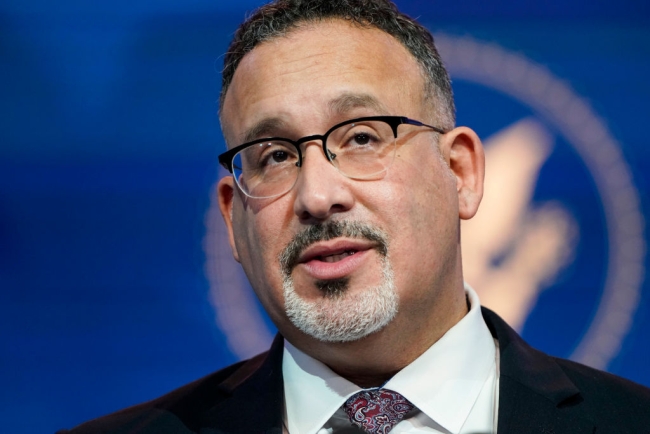You have /5 articles left.
Sign up for a free account or log in.

Education Secretary Miguel Cardona
Joshua Roberts/Getty Images
The Education Department announced yesterday that students who were cheated by for-profit institutions and previously granted partial relief on their direct federal loans will now be granted full relief. The department is rolling back a controversial formula -- established under the previous secretary, Betsy DeVos -- that gave some borrowers only partial debt forgiveness, even if it was found that they were defrauded or misled by their college.
The change will help 72,000 borrowers with previously approved “borrower-defense” claims, department officials said, and will result in an additional $1 billion in debt forgiveness, on top of any debt forgiveness those borrowers previously received.
Previously, if a borrower’s claim that they were cheated was accepted, the ED determined loan relief based on a formula. If a borrower’s earnings after graduation were two standard deviations below the median for similar programs, the department granted the borrower full relief. If the borrower’s earnings were below the median, but not by two standard deviations, the department granted 25, 50 or 75 percent relief.
Under the Obama administration, the department recommended full relief for borrowers that attended the for-profit chains Corinthian College and ITT Technical Institute. DeVos said the policies were too generous with taxpayer money and debuted the formula in December 2019.
Detractors of the formula criticized it for limiting the amount borrowers could receive and relying on earnings data that were not always informative.
The department said it will make a decision on future claims once they come in, but it will not be using the partial relief formula.
The department will also reimburse any amounts paid on the loans, request that credit bureaus remove negative credit reporting and restore federal aid eligibility where applicable. Eligible borrowers will be notified in the coming weeks, officials said.
Miguel Cardona, education secretary, said in a statement that borrowers deserve a simple and fair path to relief when they’ve been harmed by an institution.
“A close review of these claims and the associated evidence showed these borrowers have been harmed and we will grant them a fresh start from their debt,” he said.
Consumer advocacy groups lauded the decision but said more is needed.
“Borrower defense is a fail-safe to protect defrauded students who were deceived by their schools, and ultimately to prevent bad actors from taking advantage of the federal student aid system. The previous administration turned borrower defense into a total sham that was rigged to deny claims without any true consideration,” Toby Merrill, director of the Project on Predatory Student Lending, said in a statement. “Abandoning partial relief is a strong start for a narrow subset of borrowers, but what we need from the Education Department is an overhaul of the current borrower defense process.”
Whitney Barkley-Denney, senior policy counsel at the Center for Responsible Lending, said the move is a step in the right direction to help a class of borrowers that are mostly low income and people of color. “These are borrowers who did what they were told they should do in pursuit of the American dream,” she said. “It was really the school that failed them and in part the federal government in allowing these predatory schools to operate.”
Barkley-Denney said the Biden administration could go further by making it easier to apply for borrower-defense repayment and restoring some Obama-era guardrails around for-profit institutions.
“This is really a problem of the federal government continuing to give money to schools that aren’t doing their job in educating students in the way that they’re supposed to,” she said.
Career Education Colleges and Universities, the industry group for for-profit institutions, declined to comment on the change.




